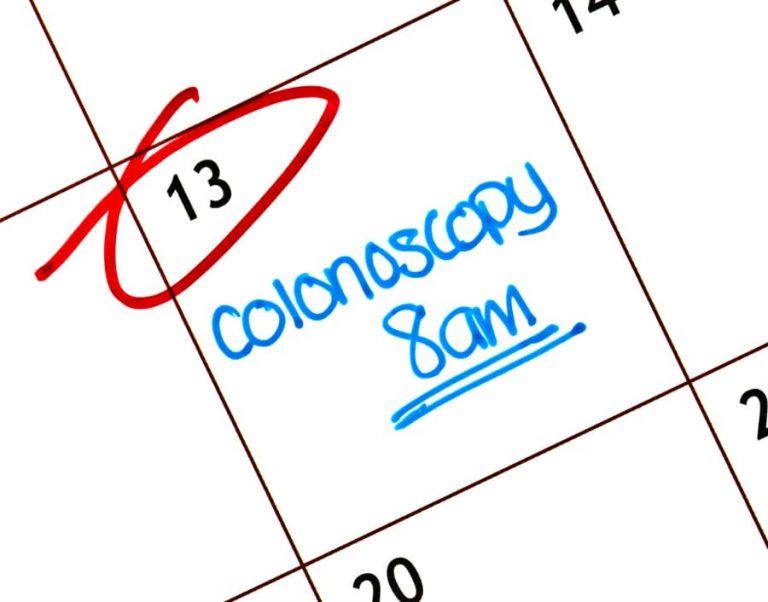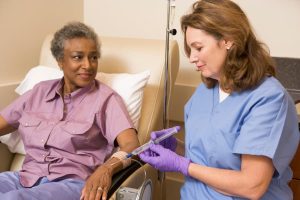
Signs of Precancerous Colon Conditions
Adenomatous polyps are a precancerous condition. They are not cancerous by themselves and are often largely harmless. Their presence, however, indicates abnormal changes to colon
HIPAA Alert: Potential Data Breach Learn More
Questions on Oncology, Hematology and/or Infusion Clinical Services due to COVID-19 Crisis – CALL 833-698-1623
Important Information for Our Patients Regarding the Coronavirus.
RCCA Providing Area Cancer Patients with Access to Care During Coronavirus Outbreak
RCCA Offering Patients Virtual Visits During Coronavirus Pandemic
Early detection is key to defeating cancer. The sooner cancer is diagnosed, the earlier treatment can begin, and the more effective it will be at eliminating cancer cells. This makes routine screening an invaluable tool. Colon cancer screening can detect signs of cancer and pre-cancer before symptoms develop, giving patients and oncologists a head start on treatment.
Many individuals diagnosed with colon cancer turn to Regional Cancer Care Associates (RCCA) for treatment. RCCA is a group of more than 100 medical oncologists and hematologists who treat patients who have solid tumors, blood-based cancers and benign blood disorders at more than 20 locations throughout New Jersey, Connecticut, Massachusetts, and the Washington, DC area.
Learn more about how routine colon cancer screening can give patients their best chance at a full recovery.
Colon cancer is the third most common cancer type in the United States, not counting skin cancers. Cancer starts as a genetic mutation. Following an alteration to its encoded instructions, a cell begins to divide rapidly. This creates a constantly growing mass of abnormal cells called a tumor. Colon cancer is a type of cancer that forms in the colon, which is part of the large intestine.
More than 100,000 new cases of colon cancer are diagnosed annually in patients as young as 20. In fact, diagnoses in patients under the age of 50 are rising, and colon cancer is one of the deadliest cancers for young adults. Fortunately, colon cancer deaths have been on the decline since the 1980s. This development is in part due to increased screenings, allowing for earlier detection. It also illustrates just how important colon cancer screening is for improving a patient’s chances of survival.

Colon cancer can cause changes in bowel habits, abdominal discomfort, and blood in stool. By the time these signs and symptoms appear, however, the colon cancer is likely already in its late stages. Early-stage cancer is often asymptomatic. This period is the ideal time to begin treatment, but detecting cancer is challenging without symptoms to prompt a diagnosis.
The solution is routine screening. Colon cancer screening tests can detect cancer in its early stages, before symptoms begin to appear. If cancer is detected, then patients and their physicians get an earlier start on treatment than would be otherwise possible. This sets patients up for the best possible treatment outcomes. Screening may even detect precancerous polyps, enabling physicians to remove them — potentially stopping cancer before it ever develops.

To be most effective, colon cancer screening must occur on a regular basis. The American Cancer Society (ACS) recommends that patients start routine screenings at age 45. This ensures that patients are regularly screened at the age when colon cancer is most likely to develop.
The above guideline is intended for patients who are at average risk of developing colon cancer. Certain health and lifestyle factors can make a person more susceptible to cancer. These include:
Patients with one or multiple colon cancer risk factors should start screening earlier. There is no single screening recommendation for at-risk patients. Instead, screening depends on the risk factors at play. If a patient has a family history of colon cancer, they may begin screening at age 35 or 40. If a patient has Lynch syndrome or another hereditary colon cancer syndrome, they may begin screening as early as age 20. Patients should speak with their primary care provider about what starting age is right for them.
There are multiple approaches for colon cancer screening. Each one has its own benefits and downsides, and its own recommended screening schedule.
Colonoscopy is the most common type of colon cancer screening. This method involves using an advanced medical camera, called a colonoscope, to examine the interior of the entire colon.
Patients must follow a liquid cleanse to clear out their colon before testing. They may also be sedated to help them relax during the test. During the procedure, carbon dioxide is used to inflate the colon. The colonoscope is then inserted into the anus. The camera provides a live video feed used to look for tumors, polyps, or other abnormalities that may indicate the presence of cancer. The oncologist may also remove any polyps or abnormal tissue for biopsy.
RCCA recommends a colonoscopy every 10 years for patients aged 50 and older with an average risk of colon cancer. Patients who have had colon abnormalities may be screened more often.
A flexible sigmoidoscopy uses a sigmoidoscope, which is like a colonoscope, to examine only the bottom 20 inches of the colon. Because less of the colon is examined, preparation for the test is less intensive. Patients are rarely sedated. The procedure is similar to a colonoscopy. The colon is inflated with carbon dioxide before the sigmoidoscope is inserted. The camera’s feed is used to examine for abnormalities and remove them if necessary for a biopsy.
RCCA recommends a flexible sigmoidoscopy every three to five years for patients aged 50 and older with an average risk of colon cancer.
A computed tomography (CT) colonography is a non-invasive colon cancer screening method. During the procedure, carbon dioxide is used to inflate the colon. Advanced X-rays are then used to take cross-sectional images of the colon. A computer knits the X-ray images together to create a 3D image of the whole colon. This image is used to examine the colon for abnormalities. If any are found, a colonoscopy or flexible sigmoidoscopy will be scheduled to remove them for biopsy.
RCCA recommends a CT colonography every three to five years for patients aged 50 and older with an average risk of colon cancer.
If diagnosed early, colon cancer is one of the most curable types of cancer. Colon cancer screening is a key part of making a cure possible. If your screening leads to a diagnosis, you can receive treatment at Regional Cancer Care Associates. RCCA specialists provide care to more than 30,000 new patients and 265,000 established patients each year. RCCA physicians offer patients innovative therapies, including immunotherapies and targeted therapy, cutting-edge diagnostics as well as access to approximately 300 clinical trials in community-based centers close to home.
What are the early symptoms of colon cancer?
Early signs of colon cancer may include changes in bowel habits, such as diarrhea or constipation, especially for extended periods. They also include blood in stool, abdominal issues, and unexplained weight loss. It is important to note that the great majority of people who experience one or more of the symptoms listed above will not have colon cancer. Nonetheless, it is important to consult a physician about these symptoms, particularly if they are pronounced, arose suddenly, or have persisted for an extended period.
Can colon cancer be asymptomatic?
Colon cancer often does not show symptoms in its early stages. This is why regular screening is recommended.
Can young people get colon cancer?
Though colon cancer is most commonly found in patients over the age of 50, it can also affect younger people. Early cancer development is most common in patients with genetic predispositions or a family history of colon cancer.
What are the main risk factors for colon cancer?
The main risk factors for colon cancer include age 50 and older, a family history of colon cancer, a diet high in red and processed meats, physical inactivity, and obesity.
How effective is a colonoscopy in detecting colon cancer?
Colonoscopy is highly effective at detecting colon cancer and removing polyps. RCCA estimates that routine colonoscopies reduce cancer deaths by up to 70%.
Thanks to these state-of-the-art screenings, colon cancer, though extremely common, has also become one of the most curable forms of cancer in the United States. If your colon cancer screening shows that you’ve developed the disease, Regional Cancer Care Associates is here to help you fight a winning battle. With dozens of locations throughout New Jersey, Connecticut, Massachusetts and the Washington, D.C., Area, our team of specialists will deliver the expert and personalized care, attention and support you deserve. For more information, contact Regional Cancer Care Associates today at 844-346-7222.

Adenomatous polyps are a precancerous condition. They are not cancerous by themselves and are often largely harmless. Their presence, however, indicates abnormal changes to colon

Colon cancer is among the most common cancer types diagnosed in the United States. According to colon cancer projections from the American Cancer Society, about

If you or a loved one has been diagnosed with colon cancer, identifying the treatment approach that’s best for you and your particular circumstances is

Regional Cancer Care Associates is one of fewer than 200 medical practices in the country selected to participate in the Oncology Care Model (OCM); a recent Medicare initiative aimed at improving care coordination and access to and quality of care for Medicare beneficiaries undergoing chemotherapy treatment.